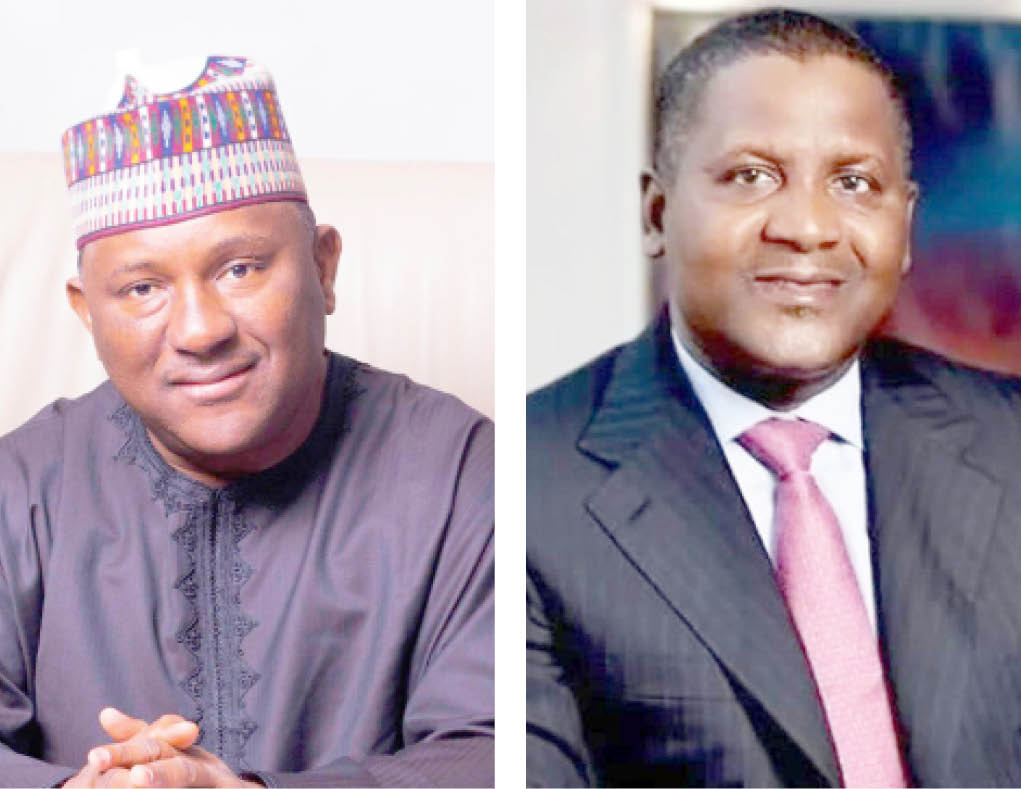Dangote Cement, Nestle, MTN Nigeria, BUA Cement and Airtel Africa are the top five firms to watch in Nigeria this year as they made N788billion as combined Profit After Tax (PAT) last year.
The companies also paid N386bn in total taxes and employed over 250,000 people during the period, according to an analysis by the chief executive officer of Financial Derivatives Company Ltd, Bismarck Rewane.
- My refinery will kick off before September – Dangote
- Dangote retains Africa’s richest man position for 11th year – Forbes
The financial analyst disclosed this in a presentation at a First Bank economic outlook webinar last week, where he outlined key opportunities for Nigeria, especially from the top five companies.
The webinar was on the backdrop of an earlier projection of 2.7 per cent growth for Nigeria this year from the International Monetary Fund (IMF) based on an expected recovery in crude oil prices and production.
Nigeria will see economic activities normalising. Key economic activities to watch out for in 2022 include global market trends, removal of subsidies, and floatation of the naira. However, recoveries in the oil sector and maximisation of the e-naira could help keep the parallel market in check.
Speaking on a section on corporate performance and opportunities for 2022, the financial expert highlighted the specific prospect in the firms.
Starting with Dangote Cement, the analysis shows that it outperformed the sector growth.
Its revenue was up by 34.2 per cent to N1.02 trillion and PAT increased by 33 per cent to N278bn. “That was a positive real rate of return of 17.6 per cent.”
The company now projects a profit of about N320bn in 2022, and in addition to other prospects tied to the Dangote Group this year, such as the Dangote refinery, which will commence in the fourth quarter of this year, is billed to enhance refined petroleum distribution in Africa and attract foreign investors.
MTN Nigeria also outperformed the telecom sector as its revenue went up by 23 per cent to N1.2trillion, and PAT grew by 52 per cent to N220bn. It has a profit projection of about N340bn this year with increased capital expenditure (capex) and network capacity.
The successful bid for 5G technology will give it an edge, and its Payment Service Bank (PSB) operations will further boost its telecom earnings and revenue base
For Nestle, the analysis shows its top line went up 23 per cent to N261bn and PAT rose up 5.2 per cent to N33.5bn as a result of increased business and economic activities. It paid N6.3bn as tax last year, a 20 per cent increase, just as the company eyes a projected profit of N38bn in 2022 while it hopes to benefit from brand loyalty.
BUA Cement recorded a N2.32trn market capitalisation while its revenue grew by 19 per cent to N186bn and its PAT rose by 23 per cent to N65.9bn.
The company, which just commissioned its 3m metric ton cement plant line 4 in Sokoto and has started another 3m MT line 5 expansion, increased its tax payment figure by 47 per cent last year to N8.4bn, triggered by more sales.
Airtel Africa recorded a N2.93trn market capitalisation while its revenue grew by 25.2 per cent to $2.27bn and its PAT rose by 131per cent to $335 million. The company paid $232m tax, an increase of 59 per cent.
Politics spending, oil prices, others to influence economy
According to Rewane’s projection of the activities this year, politics of 2022 will be different from 2021. This is because while it is a preparatory to the 2023 general elections, there are two elections (Ekiti and Osun) happening this year.
On the global front, oil price is expected to average $70-85 per barrel (pb), stated Rewane. Happening faster, reports on Wednesday confirmed Brent crude hit a seven-year high above $90 a barrel, a milestone not recorded since seven years, last heard of in 2014.
The oil price surge was said to have been related to tensions between Russia and the West. Threats to the United Arab Emirates from Yemen’s Houthi movement had added to oil market jitters.
Russia, the world’s second-largest oil producer and the West have been at loggerheads over Ukraine, fanning fears that energy supplies to Europe could be disrupted, although concerns are focused on gas supplies rather than crude.
Benchmark Brent fell 15 cents to $89.81 a barrel by 1:17 p.m EST (1817 GMT), while U.S crude fell 20 cents to $87.15 a barrel in a volatile session, with both contracts see-sawing between positive and negative territory.
“The market is very erratic on headlines on the Russia-Ukraine situation. There’s uncertainty about what’s going to happen,” said Phil Flynn, a senior analyst at Price Futures Group.
Weighing on prices, the U.S Federal Reserve said on Wednesday that it was likely to raise interest rates in March and planned to end its bond purchases that month to tame inflation.
The U.S dollar climbed after the announcement, making oil more expensive for buyers using other currencies.
It eased on Thursday as the market balanced concerns about tight worldwide supply with expectations the U.S Federal Reserve will soon tighten monetary policy. But there are hopes of a further climb as the global oil market is starting to turn its attention to a February 2 meeting of the Organization of the Petroleum Exporting Countries (OPEC) and allies led by Russia, a group known as OPEC+.
It has raised its output target each month since August by 400,000 barrels per day (bpd) as it unwinds record production cuts made in 2020. However, the group has faced capacity constraints that have prevented some members from producing at their quota levels.
Rewane predicted in his analysis that oil production quota is expected to rise further as OPEC+ continues to expand output, but output will remain limited by sabotage at 1.4 -1.6 million barrels per day (bpd) for Nigeria.
More so, the Central Bank of Nigeria (CBN) is likely to increase foreign exchange (forex) supply to manufacturers while it is expected that pre-election spending may drive up cash in circulation and increase money supply.
Expected state of economic performance
Economic performance will be largely determined by the successful implementation of the 2022 budget and the newly approved 5-year national development plan (NDP) for 2021-2025.
According to the financial analyst, the aim of the new plan is to achieve an average real gross domestic product (GDP) growth of 5 per cent over the planned period.
To realise this, the government is going to take key measures like broadening the tax base, enhancing the capacity of the private sector by creating investment opportunities and deliberate policy engagements and incentives, he noted.
The 77-page analytical report on the 2022 outlook concluded that this year will be of two halves, which takes in reform, as well as political considerations and labour union activities.
Daily Trust on Sunday reports that such is already happening. The government was forced to retain the monthly petrol subsidy beyond June this year just on Tuesday after so much political and labour pressures.
Although the Petroleum Industry Act (PIA) 2021 stipulates full deregulation of the petroleum industry, the planned nationwide strike for last Thursday and Senate President Ahmad Lawan had also pressured the presidency and the Minister of Finance, Budget and National Planning, Zainab Ahmed to hold on.
The minister succumbed by presenting a N3trillion proposal for subsidy for the 2022 fiscal year to the Federal Executive Council (FEC) on Wednesday. And that was approved. Now, the National Assembly will have to amend the N17.1trillion budget and include that.
The economic report also stated that insecurity could prove tricky to contain and become a political campaign tool for the opposition while the CBN could increase forex supply to manufacturers and ease currency pressures.
More so, pre-election spending will be positive for aggregate demand and will boost corporate performance, just as declining inflation will be positive for consumer purchasing power.
At the global level, monetary tightening in advanced economies could trigger capital outflows, while oil prices will remain relatively stable.
With rising technology, competition between traditional banks and fin-techs will intensify. This could force banks to reduce or eliminate transaction costs and only banks with constant innovation and regional diversification would remain resilient this year, Rewane said.

 Join Daily Trust WhatsApp Community For Quick Access To News and Happenings Around You.
Join Daily Trust WhatsApp Community For Quick Access To News and Happenings Around You.


